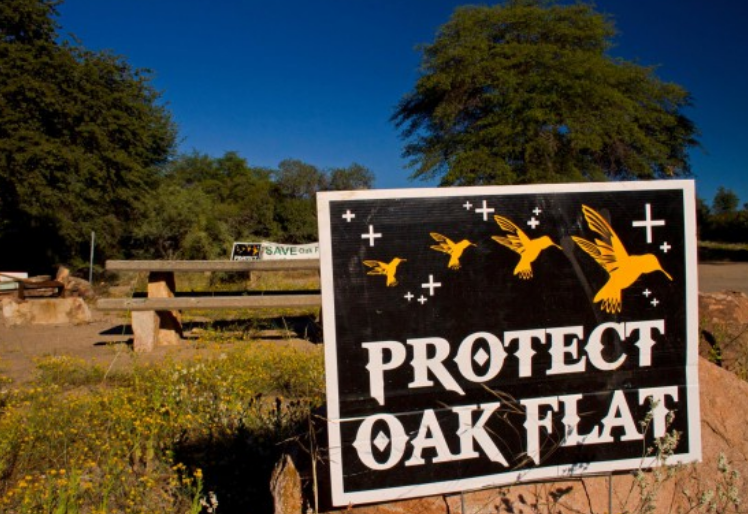
- Details
- By Native News Online Staff
WASHINGTON — The U.S. Forest Service released the 408-page FINAL Environment Impact Statement: Resolution Copper Project and Land Exchange (FEIS) on Friday that will allow for the transfer of 2,500 acres of land—that includes Oak Flat— to British-Australian corporate mining giant Rio Tinto and its subsidiary, Resolution Copper.
If the transfer is not halted, Resolution Copper plans to dig a huge mine under Oak Flat or Chi'chil Bildagoteel, a site considered sacred to Apaches and other tribal nations.
Oak Flat was one of several projects opposed by tribes and environmental organizations that the Trump administration fast-tracked because they would face more scrutiny in the upcoming Biden administration.
"The Trump Administration rushed to publish a seriously-flawed FEIS just five days before President Trump leaves office," San Carlos Apache Tribal Chairman Terry Rambler said on Friday. "This callous, immoral and illegal action is being done to enrich wealthy foreign mining interests while knowing that mining will destroy Oak Flat that for many generations has been the heart of Apache religious and cultural practices. We were left with no choice but to file this lawsuit to prevent the transfer of Oak Flat after release of the FEIS."
The FEIS released Friday concedes there mining the Oak Flat area will create the potential of disruption of the sacred land.
“Measures to resolve adverse effects on known historic properties, including but not limited to data recovery, have been developed through consultation with the State Historic Preservation Office (SHPO), tribes, and others. However, there is the potential for some portion of existing yet currently unidentified prehistoric and historic artifacts and resources to be disturbed or destroyed, especially within the Oak Flat subsidence area and the footprint of the tailings storage area. These losses potentially could include human burials within these areas,” the FEIS said.
Apache Stronghold, on behalf of traditional Apache religious and cultural leaders, sued the Trump administration on Tuesday in U.S. District Court in Phoenix to stop the transfer.
A strong advocate for Native American issues in Congress, Rep. Raúl Grijalva (D-AZ), who chairs the House Natural Resources Committee, has introduced a bill to repeal the transfer.
"The Biden administration should know on day one that this handover is a politically motivated travesty of justice, and every responsible agency in this process should carefully review its compliance with the National Environmental Policy Act and other applicable laws," Grijalva said on Friday.
Friday’s release by the U.S. Forest Service of its FEIS began the clock for a 45-day period for the public present comments.
More Stories Like This
Native News Weekly (August 25, 2024): D.C. BriefsNative News Weekly (February 22, 2026): D.C. Briefs
NCAI Releases Sttatement on the Passing of Rev. Jesse Jackson
Colusa Indian Energy Participates in Port of Quincy Town Hall on Columbia Basin Power Project
Q&A: Jingle Dress Dancer Answered Call to Ceremony in Face of ICE Violence
Help us defend tribal sovereignty.
At Native News Online, our mission is rooted in telling the stories that strengthen sovereignty and uplift Indigenous voices — not just at year’s end, but every single day.
Because of your generosity last year, we were able to keep our reporters on the ground in tribal communities, at national gatherings and in the halls of Congress — covering the issues that matter most to Indian Country: sovereignty, culture, education, health and economic opportunity.
That support sustained us through a tough year in 2025. Now, as we look to the year ahead, we need your help right now to ensure warrior journalism remains strong — reporting that defends tribal sovereignty, amplifies Native truth, and holds power accountable.
 The stakes couldn't be higher. Your support keeps Native voices heard, Native stories told and Native sovereignty defended.
The stakes couldn't be higher. Your support keeps Native voices heard, Native stories told and Native sovereignty defended.
Stand with Warrior Journalism today.
Levi Rickert (Potawatomi), Editor & Publisher

